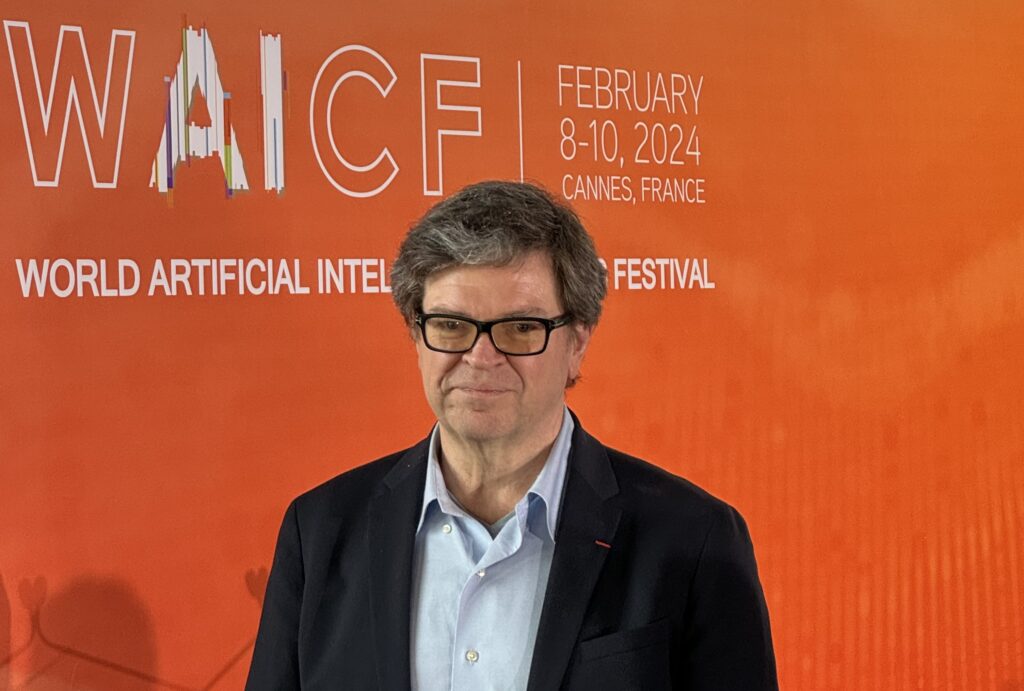Lately, artificial intelligence seems to be at the heart of every conversation, amidst concerns, potential, and dystopian visions. It is within this rich and complex context that we had the privilege to attend the World AI Festival in Cannes, an event dedicated to innovation in the field of AI. For us at Dedalo AI, a startup committed to reducing the environmental impact of software, it was a precious opportunity for growth and exchange with leaders and innovators from around the world.

Trends
We set off on the evening of February 7th from I3P, the incubator of the Polytechnic University of Turin that hosts our startup: a four-hour car journey through Liguria, and then Cannes, with its Art Nouveau buildings, high-fashion boutiques, countless design shops, and Christmas lights still on the trees.
The WAICF takes place from February 8th to 10th in the Palais des Festivals in Cannes, right where the famous film festival is held: having finalized the last details, we set up our booth in the area dedicated to Italian startups. The delegation organized by the Italian Trade Agency (ITA) includes another 30 startups and innovative SMEs, which with us brought their testimony on artificial intelligence and sustainability to France.
It’s clear from the start that AI’s application spans numerous sectors, from healthcare to sports, cosmetics to sustainability, offering innovative and cutting-edge solutions. The main trends are, of course, generative AI and data analytics, but the enormous variety of enterprises testifies to how many opportunities artificial intelligence can offer. For example, we met a startup that aims to find the perfect skincare for every person and need, or another that works on optimizing the work of neuroradiologists by combining neuroscience and machine learning.

Discussions
From the rich schedule of panels and keynotes over the two days, the first day’s highlight was the speech by Yann LeCun, father of some of the most important research on artificial intelligence. According to the scientist, who is also the head of FAIR, Meta’s artificial intelligence research department, open source is indispensable for progress, especially in AI models, for a healthy and transparent evolution. In light of the European AI Act, he also discussed regulations, emphasizing the necessity of leaving freedom for research to expand humanity’s potential, whose progress in the near future will be increasingly linked to AI. To those who raise alarms about the dangers of artificial intelligence, LeCun explained that it makes no sense to talk about technological singularity, i.e., a dominance of machines over humans. The current language models, on which the most popular AI applications are based, in terms of skills and competences, are not even comparable to a 4-year-old child. The next evolutionary step will be multimodality, which will allow systems to consider different types of data in model construction, enabling the creation of richer and more accurate models.
Another intervention that struck us was by Dr. Raul Villamarin Rodriguez, Vice President of Woxsen University in India. He spoke about Necrobotics, i.e., robots made with organic material activated by the electrical stimuli of an artificial intelligence system. It seems like science fiction, somewhat macabre, but it is a very promising research field, destined for concrete developments, especially in the healthcare field.
The 2024 edition of the WAICF recorded a record number of attendances, with a significant Italian participation; compared to other fairs, at the beginning, it didn’t seem like there were many people, but we were pleasantly surprised by the number of people we met and the level of the conversations. Participating in the World AI Festival not only offered Dedalo AI international visibility but also allowed us to establish valuable connections with other entities that share our vision. We met many people and learned many things, but more importantly, is the awareness that there are other innovators who, like us, want to use artificial intelligence for good.
This article was translated from the original article published on La Repubblica and Italian Tech.
